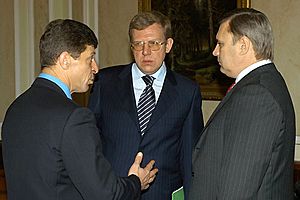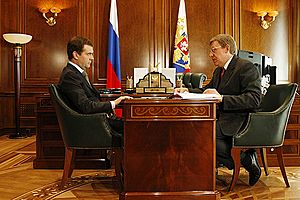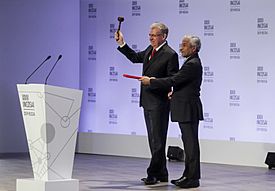Alexei Kudrin facts for kids
Quick facts for kids
Alexei Kudrin
|
|
|---|---|
|
Алексе́й Ку́дрин
|
|
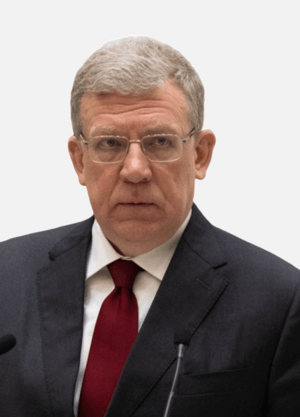
Kudrin in 2020
|
|
| 4th Chairman of the Accounts Chamber | |
| In office 22 May 2018 – 30 November 2022 |
|
| Preceded by | Tatyana Golikova |
| Succeeded by | Galina Izotova (acting) Boris Kovalchuk |
| Minister of Finance | |
| In office 18 May 2000 – 26 September 2011 |
|
| Prime Minister | Mikhail Kasyanov Viktor Khristenko (acting) Mikhail Fradkov Viktor Zubkov Vladimir Putin |
| Preceded by | Mikhail Kasyanov |
| Succeeded by | Anton Siluanov |
| Deputy Prime Minister of Russia | |
| In office 18 May 2000 – 9 March 2004 24 September 2007 – 26 September 2011 |
|
| Personal details | |
| Born | 12 October 1960 Dobele, Latvian SSR, Soviet Union (now Latvia) |
| Political party | Independent |
| Other political affiliations |
Civil Initiatives Committee (2012–) |
| Alma mater | Leningrad State University Russian Academy of Sciences |
| Signature |  |
Alexei Leonidovich Kudrin (born 12 October 1960) is a Russian politician and economist. He is known for his work in finance. From 2018 to 2022, he was the Chairman of the Accounts Chamber of Russia. Before that, he served as the Minister of Finance from 2000 to 2011. Since December 2022, he has been an advisor for corporate development at Yandex, a large technology company.
After finishing his studies in finance and economics, Kudrin worked in the city government of Saint Petersburg. He then moved to work for the Russian President's office in 1996. He became the Finance Minister in May 2000 and held this job for 11 years. This made him the longest-serving Finance Minister in Russia after the Soviet Union ended. He was also a Deputy Prime Minister for some of these years. As Finance Minister, Kudrin was praised for managing Russia's money carefully. He also worked on tax and budget reforms and supported a free market economy.
Under Kudrin's leadership, Russia paid off most of its large foreign debt from the 1990s. This left the country with one of the lowest foreign debts among major economies. A lot of the money from oil exports was saved in a special fund called the Stabilization Fund of the Russian Federation. This fund helped Russia deal with the 2008 financial crisis much better than many experts expected. Kudrin has received several awards for his work, including "Finance Minister of the Year 2010" from Euromoney magazine. He left his position as Finance Minister in September 2011.
Contents
Biography
Early Life and Education
Alexei Kudrin was born on 12 October 1960 in Dobele, which was then part of the Latvian SSR. His father was Russian and his mother was Latvian. His first job was as a motor mechanic. He later studied economics at Leningrad State University and graduated in 1983. He continued his studies and earned a PhD in economics. Kudrin has written more than 15 academic papers on economics and finance.
Working in Saint Petersburg
From 1990 to 1996, Kudrin worked in the city government of Saint Petersburg. He worked under the mayor, Anatoly Sobchak, who was a reformer. Kudrin held various financial roles in the city administration. From 1993 to 1996, he was a deputy mayor. At that time, future president Vladimir Putin was also a top deputy mayor in Saint Petersburg. Kudrin also led the city's Economic and Finance Committee.
Working for the President
In August 1996, Kudrin started working for the President's office under Boris Yeltsin. He was in charge of trade, economic, and scientific cooperation. In March 1997, he became the first deputy finance minister. On 28 May 2000, the new president, Vladimir Putin, appointed him as the Finance Minister. Besides being Finance Minister, Kudrin also served as a Deputy Prime Minister from 2000 to 2004 and again from September 2007.
Finance Minister
Kudrin was Russia's Finance Minister from May 2000 to September 2011. He was part of a group called "St Petersburg economists." These were liberal reformers who had worked with Putin in Saint Petersburg. Many people believe Kudrin and Herman Gref were key in shaping Russia's economic plans during Putin's time as president.
Careful Money Management
During Putin's presidency, Russia managed its economy very carefully. Extra money from oil exports was put into special funds. The Stabilization Fund of the Russian Federation is widely seen as Kudrin's idea. Many experts consider this fund one of his biggest achievements. This fund was later split into the Reserve Fund and the National Welfare Fund in 2008.
In 2005, Kudrin disagreed with Prime Minister Mikhail Fradkov about cutting the VAT tax. Fradkov wanted to lower it, but Kudrin argued that it could harm the Russian currency and force the government to use money from the stabilization fund. Kudrin won the "Finance Minister of the Year 2005" award from Banker magazine.
On 21 August 2006, Russia paid off its debts to the Paris Club, which totaled $23.7 billion. Experts praised Kudrin for sticking to his plan to repay the debt. They also credited him with managing the ruble's exchange rate well. His careful financial management helped prevent serious problems from the "Dutch disease," which is when a country's economy relies too much on one resource, like oil. In 2006, Kudrin also received the "Best Finance Minister of a Developing European Country" award.
Kudrin faced criticism from others in the government who wanted to spend the money on developing the country. However, Kudrin's approach of saving money proved very important. These savings helped Russia get through the 2008 financial crisis much better than many expected. Kudrin was widely praised for these policies.
Other Economic Ideas
Kudrin often supported selling state-owned companies to private owners and reducing the government's role in the economy. However, he also supported creating "national champions," which are large companies that are important for the country. Kudrin believed the government's role in the oil industry should not grow too much. He said that state ownership of such companies was not a final goal.
As Finance Minister, Kudrin also supported increasing the retirement age and reducing government paperwork. He often faced criticism for his policies, especially from the United Russia party, which he refused to join.
The 2008 Economic Crisis
After the global economic crisis in the late 2000s, Russia's state budget had a deficit (spent more than it earned) for the first time in years. Kudrin said that the government aimed to have a budget with no deficit by 2015. He also warned that Russia would soon have to adjust to being a country "just like everyone else." He called for the government to use its money more effectively.
Finance Minister of the Year 2010
In October 2010, Euromoney magazine named Kudrin "Finance Minister of the Year 2010." The magazine called him a "fiscal manager of the highest order." They praised his support for the free market and careful spending. Euromoney also noted that the Stabilization Fund, which Kudrin created, helped Russia pay off its foreign debt early. They also praised his commitment to tax and budget reform, Russia's desire to join the World Trade Organization (WTO), and continued progress in privatization.
At the award ceremony, Kudrin said he felt satisfied when his work showed results. He added that it was especially important when professionals praised his achievements.
After Government Roles
From September 2011 to May 2022, Kudrin was the Dean of the Faculty of Liberal Arts and Sciences at St. Petersburg University. As of 2016, he is a co-chairman of the board of trustees for the Mariinsky Theatre. He also chairs the board of trustees for the foundation of the European University at St. Petersburg.
Political Activities
Kudrin leads the Civil Initiatives Committee. This is a non-governmental organization that works to promote human rights and the development of Civil society in Russia.
Chairman of the Accounts Chamber
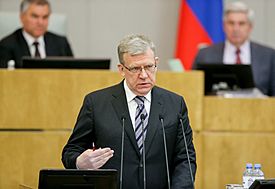
After the 2018 Russian presidential election, Kudrin was nominated to become the Chairman of the Accounts Chamber of Russia. This is a government body that checks how the government spends money. On 22 May 2018, the State Duma (Russia's parliament) approved Kudrin for this position.
On 25 September 2019, Russia took over the presidency of the International Organization of Supreme Audit Institutions. Kudrin became the president of this international organization.
On 29 November 2022, Alexei Kudrin announced he would leave his job as chairman of the Accounts Chamber. He wanted to work in the private sector. The next day, the Federation Council (another part of Russia's parliament) officially removed him from the position.
Kudrin and Yandex
In September 2022, news came out that the founder of Yandex, Arkady Volozh, had offered Kudrin a job. Volozh reportedly offered Kudrin a share of the company for help in dividing it into two parts. One part would focus on self-driving cars in Europe, and the other part of Yandex would stay in Russia. There were also rumors that Kudrin would take a leadership role in the Russian part of Yandex. On 9 December 2022, Kudrin officially started working at Yandex as a Corporate Development Advisor.
Personal Life
Alexei Kudrin was married and has a daughter. His hobbies include playing tennis, swimming, and listening to music.
See also
 In Spanish: Alekséi Kudrin para niños
In Spanish: Alekséi Kudrin para niños


